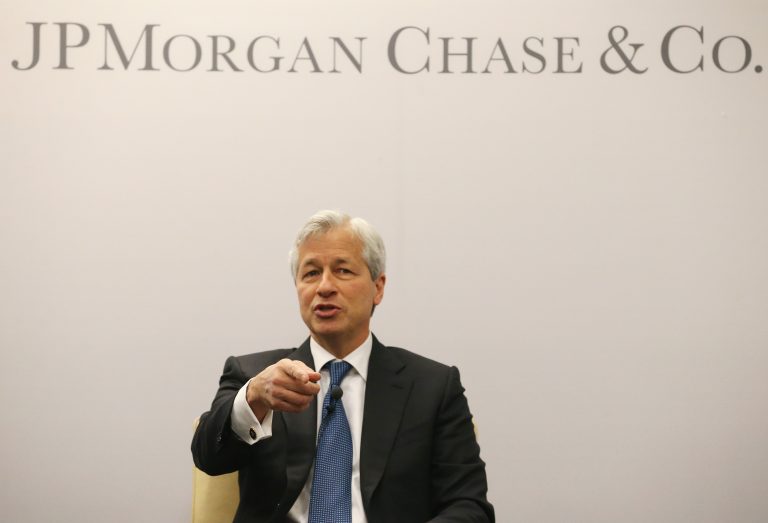
Nigeria is inching closer to rejoining JP Morgan’s Government Bond Index, nearly a decade after it was dropped over concerns that rattled global investors and forced billions in capital flight.
The renewed push, now buoyed by sweeping currency reforms under the Central Bank of Nigeria (CBN), is being framed by authorities as a vital step in restoring the country’s global financial credibility.
Patience Oniha, Director-General of the Debt Management Office (DMO), confirmed the development during a high-level investor engagement on the sidelines of the IMF/World Bank Spring Meetings in Washington, D.C., where Nigeria’s Ministry of Finance and the CBN jointly briefed portfolio managers and institutional investors on macroeconomic developments.
Register for Tekedia Mini-MBA edition 19 (Feb 9 – May 2, 2026).
Register for Tekedia AI in Business Masterclass.
Join Tekedia Capital Syndicate and co-invest in great global startups.
Register for Tekedia AI Lab.
Oniha revealed that discussions with JP Morgan were “advanced” and hinged on reforms to Nigeria’s foreign exchange (FX) market.
“We think we are eligible now,” she said, pointing to the liberalization of the FX regime, which had previously triggered Nigeria’s expulsion from the index in 2015. “The reforms have addressed key challenges such as illiquidity and the difficulty investors faced in exiting the market. These were the sticking points.”
Nigeria’s potential re-entry into the JP Morgan GBI-EM Index would mark a major inflection point in its relationship with global investors. The index is widely tracked by institutional fund managers with trillions in assets under management. Membership not only signifies investor confidence but also guarantees access to a stream of passive capital inflows from funds that track emerging markets.
According to analysts, inclusion could channel as much as $2 billion in immediate foreign portfolio investment into Nigeria’s local debt market, providing much-needed support to the naira and reducing pressure on external reserves. A senior investment strategist familiar with the talks said such a move would act as a global vote of confidence in the Central Bank’s efforts to restore FX stability and rebuild credibility.
Nigeria was first included in the JP Morgan Government Bond Index in 2012, following the development of a more liquid domestic bond market and the introduction of reforms that allowed for two-way FX pricing and better investor access. But three years later, the relationship soured. In January 2015, JP Morgan placed Nigeria on its Index Watch List, citing growing concern over foreign exchange illiquidity, opacity in exchange rate management, and a deteriorating macroeconomic framework. That culminated in Nigeria’s removal from the index in September 2015 after it failed to resolve those issues—chief among them the inability of investors to repatriate funds due to FX rationing and capital controls.
That exit coincided with an oil price slump and marked the beginning of a long stretch of FX instability, double-digit inflation, and a loss of investor confidence that Nigeria is only now beginning to reverse.
At the heart of Nigeria’s fresh bid is the FX reform drive launched by the CBN since mid-2023. Under the current administration, the central bank has collapsed multiple exchange rates into a single, more market-reflective rate, ended arbitrage-prone special windows, and taken steps to curb artificial price fixing in the official market. These moves have narrowed the gap between the official and parallel market rates, improved liquidity through interventions, and attracted cautious optimism from investors who have long complained of a non-transparent FX regime. But the recovery is far from complete.
Sources familiar with the re-engagement process told Nairametrics that JP Morgan remains cautious. One of the sticking points is the depth and functionality of Nigeria’s local bond market, which needs to be more robust to meet index criteria. A source noted that while there’s progress, the market still lacks the depth and liquidity that foreign investors require.
“We’re not yet at the finish line, but if the momentum continues, Nigeria could be back in before the end of the year,” the source said.
While talks are advancing, Nigeria is still haunted by its recent past. In 2022, JP Morgan downgraded its outlook on Nigerian sovereign debt, citing poor fiscal management despite record oil prices. The bank highlighted the depletion of FX reserves, surging debt service costs, and opaque subsidies that continued to strain public finances. Those concerns have yet to fully dissipate. Just earlier this month, JP Morgan advised clients to unwind long positions in Nigeria’s OMO bills amid signs of renewed pressure on the country’s oil-dependent economy. It warned of the risk of declining fiscal buffers, falling oil revenue, and global trade headwinds that could expose Nigeria’s financial system to further vulnerabilities.
Analysts believe that if successful, Nigeria’s re-entry into the JP Morgan index could have significant downstream effects. Among other things, it is expected to lower the country’s cost of borrowing, as index inclusion would draw demand for local bonds and compress yields. The influx of dollar inflows from passive investment funds could ease pressure on the naira, which has faced volatility and depreciation in recent years. Renewed foreign interest could also improve liquidity and pricing efficiency in Nigeria’s bond market, spurring broader capital market development. A successful re-entry may also nudge other rating agencies, funds, and financial institutions to re-engage with Nigeria’s fixed-income market.
However, despite the CBN’s reforms, currency volatility and inflation remain high. Headline inflation rose above 33 percent in March 2025, eroding real returns on fixed-income instruments. Fiscal discipline is also under scrutiny, particularly as the government struggles to rein in spending amid subsidy-related pressures and low tax revenue.
Ultimately, Nigeria’s push to rejoin the JP Morgan index is as much a reputational repair effort as it is a strategic financial move. While a return to the index may signify that the worst is over, experts note that only consistent policy execution will convince the market that a genuine turnaround is underway.



